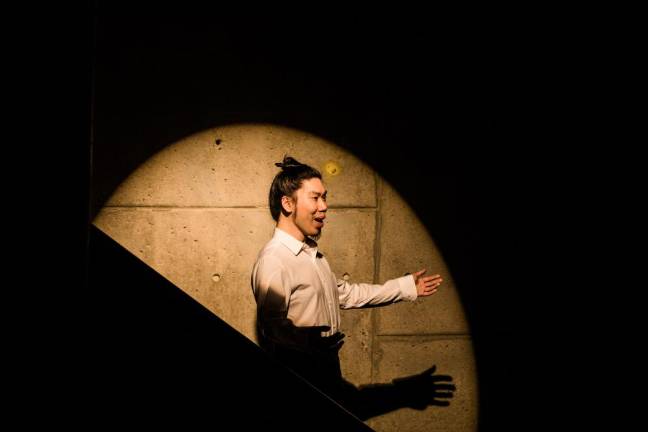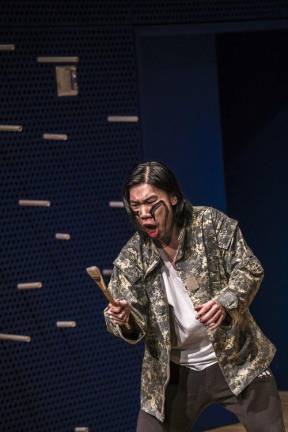A Musical Wild Card
How singer, composer and conceptual curator Ju-eh, born in China, found his artistic identity in New York
Ju-eh is a true 21st century artist. As an operatic countertenor, composer and overall conceptual curator, he has written operas, performed music, and created collaborative projects all over New York that defy genre, period or easy categorization. The richness and originality of his work derives from his varied background: Ju-eh grew up in Guangzhou, China, and studied at the Guildhall School of Music & Drama in London, The Royal Conservatory in the Netherlands and the Mannes College of Music in New York. His unique identity as an artist is gaining him a lot of notice: he recently performed with the LA Philharmonic in Meredith Monk's opera "Atlas," and sang in American Opera Project's production of "The Night Falls." He is slowly but surely building a reputation as an artist to watch in classical music. We sat down with him last week to talk about his upcoming engagement at the Prototype Festival, his experience feeding oranges to an audience and why he loves New York.
Where are you from?
I am from Guangzhou, China. That is south of China. And then I went to study in Europe, so I keep telling people I have some different selves. So, my moral basic occupational self is southern Chinese, and then my musical sense was formed when I was in Europe, and my artistic self, where I found my identity, is in New York.
So I always have this idea of me: how do I bring different selves together? That's my background.
How did you start singing? Where did your journey start?
I think the first thing that I heard was my grandma told my mother [that] when I was very young, maybe two, when the radio was on, my bum was always shaking in the right beats. My grandma was an amateur [chorister], and she said it was never wrong; it was always on the beat.
When I was young, I learned pop songs. Especially the female ones. So I was really tuned to this sort of very high voice. It was special for me. I knew I was more like a countertenor before I knew what countertenor was. Because it's more a Western term, isn't it? When I was in China, I would just follow those few pop stars, and buy their albums and just learn it in a week by ear. And I would memorize all the lyrics and just learn all of them.
I knew what falsetto was. I just knew. No one told me.
Why did you move to New York? How does living in New York inform your work?
When I arrived in New York, it was a big shift. Because I see how people are making their path, so that was very inspiring. Like, many things [you see on] the street, you look like a certain way, maybe it's going to be read as weird. But no one cares in New York. That was very special to me at that point. Because I had too many rejections with me. And it was in Europe, where it was a society that they always had something to look up to. Like if you're in Britain, you kind of have to look up to the British behavior, and thinking "oh, that is the model of some kind." I just think in New York it's much less of that. When I arrived here four years ago, I really needed that. I was way too insecure or negative about my own faith at that point.
I felt that I was trapped in a very small place. I had to break through. And the way I was thinking was, I have to make my path. I need to be understood. If I don't break through, I don't know who I am anymore.
What are some ways in which you've "broken through?" What's the wildest thing you've ever done on stage?
Peeling an orange and feeding an audience while singing. I was singing "If Music Be the Food of Love." It was under red lights, completely red, in a brownstone house. And the audience was sitting in chairs. And for that song, someone was giving me a bowl of oranges, and I just peeled it, and put it in one person's mouth while I'm singing, and everyone else really was both [frightened] and excited at the same time. I never seen people so much eager wanting to be fed. But they were frightened at the same time. It was hilarious.
Tell us about your upcoming engagement at the Prototype Festival. How did it come about, and what attracted you to the project?
Someone reached out to me to ask whether I had the interest in auditioning for the [role of] the moon. They were promoting this as a creative process that changes along the way between the drama, the words, and the music. And I think it really fits my philosophy, and that I think music should keep changing. But the creative process, it was really intriguing for me. And being the moon, I have some faith in myself doing that. So I auditioned for them. It was based on a Japanese Noh play, although I'm not from Japan but I'm very always respectful of their culture and things. So it's quite fitting.
When an audience member comes to hear you sing, what do you hope they take away from the experience?
I would think what art is to me, it means to heal. I want them to feel inspired, and more with themselves. I think that's my goal of making music, because I want to go to the performance [and leave] inspired, and more comforted. I just want to feel more comfortable, and I have more space as a person.
There was a director [who I knew] who said, "a [play] is something that you gently open the audience's mouth, and then you let them take whatever they want to take in their mouth." And so a good piece of music/theater/opera or anything, it's very important that you provide options. That the tools are provided to them, so that whatever they want to take, they can take the strawberry, they can take the pineapple. So they make their own meal. It's like a buffet. You take your own food, and you feel filled.
This interview has been edited and condensed.

